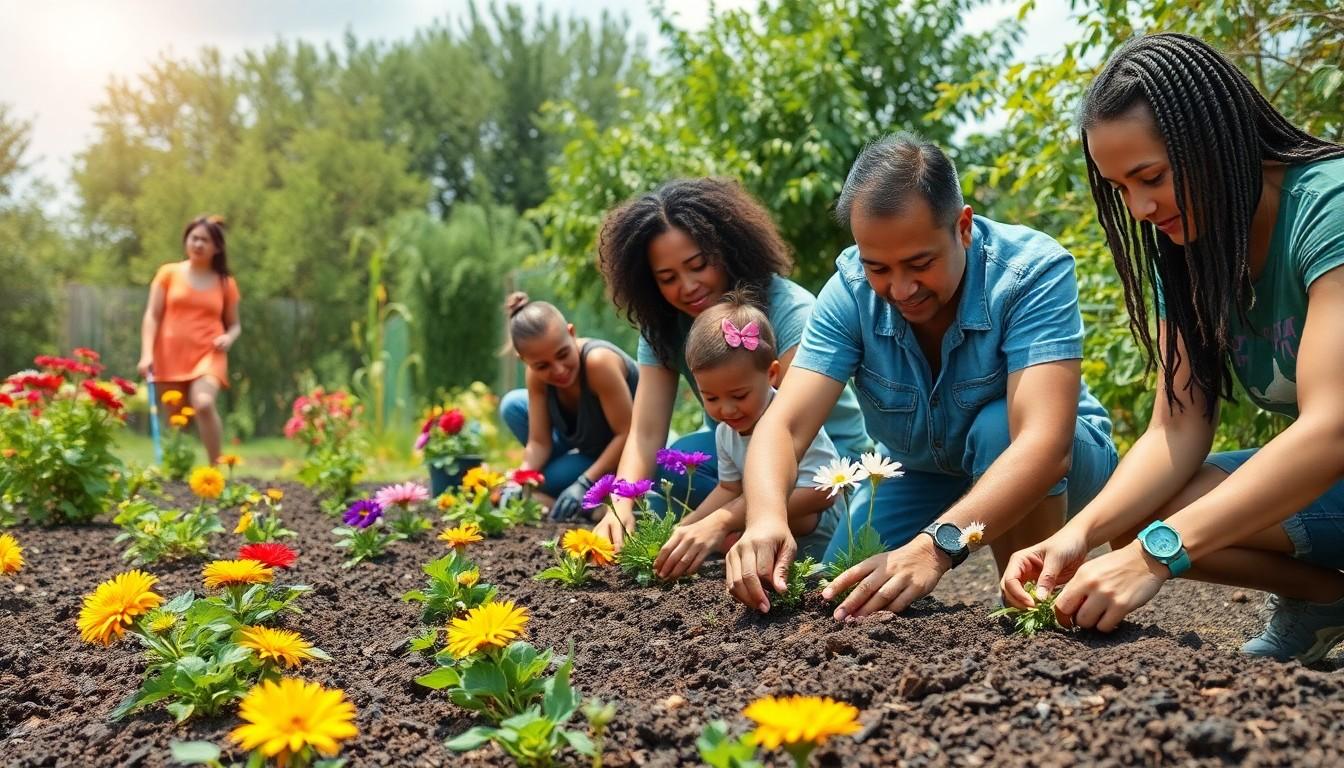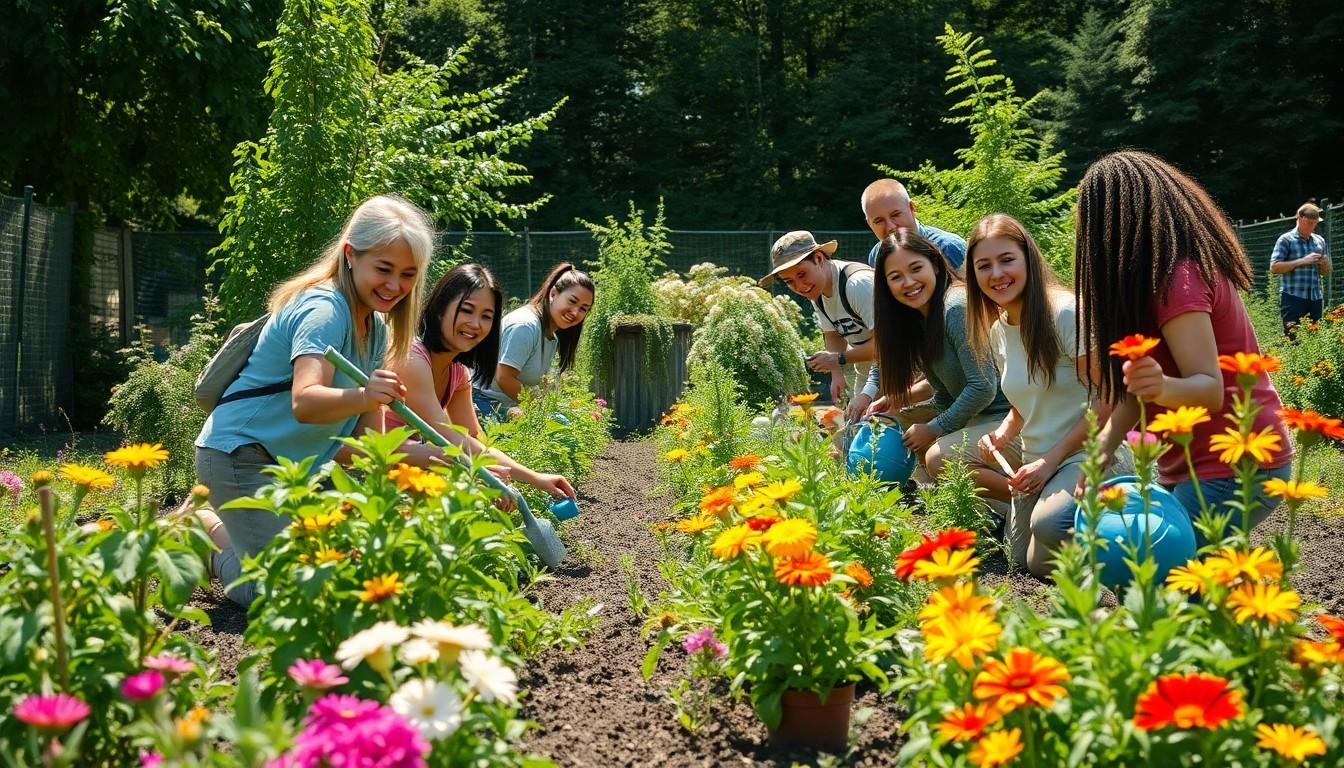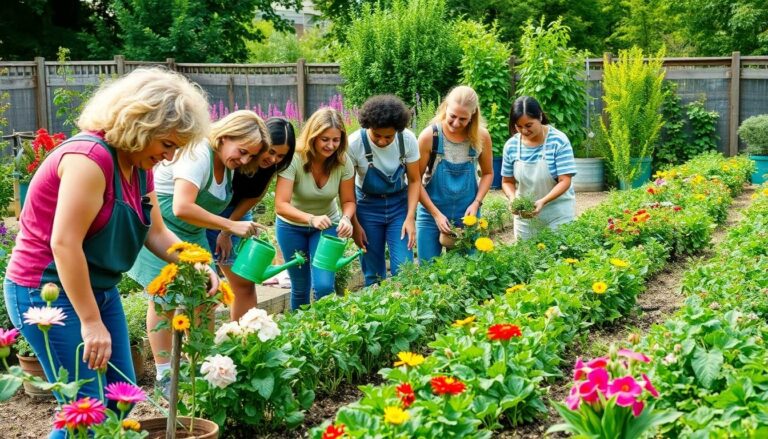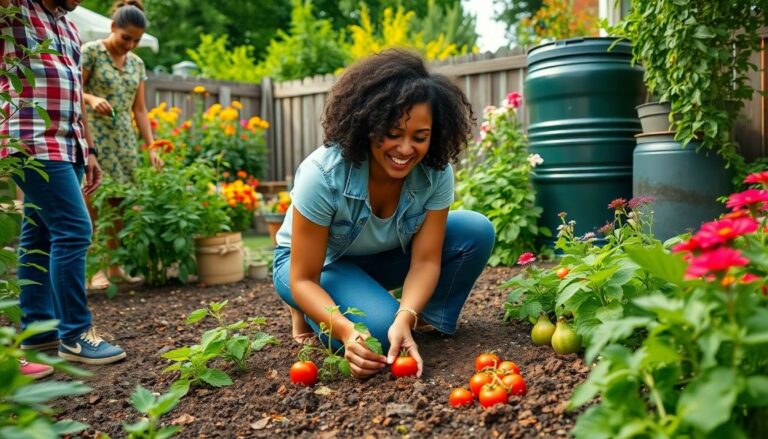In a world where even your houseplants can thrive on social media, sustainable garden practices are the new cool kids on the block. Imagine transforming your yard into a lush paradise while saving the planet, one compost pile at a time. It’s not only about growing veggies; it’s about cultivating a greener future.
Ditch the toxic chemicals and embrace nature’s wisdom. With a sprinkle of creativity and a dash of humor, anyone can turn their garden into an eco-friendly haven. Whether you’re a seasoned green thumb or just starting out, sustainable gardening offers a chance to connect with nature and enjoy the fruits of your labor—literally! So grab your trowel and let’s dig into the delightful world of sustainable gardening practices that’ll have your neighbors green with envy.
sustainable garden practices
Sustainable gardening practices focus on creating eco-friendly environments that promote biodiversity and environmental health. These methods prioritize soil health, reduce chemical use, and encourage natural pest control.
Composting stands as a cornerstone practice. Compost enriches soil, reduces waste, and provides essential nutrients. Utilizing kitchen scraps and yard waste creates a closed-loop system, minimizing landfill usage.
Native plants serve a dual purpose. They require less water, attract local wildlife, and adapt to local conditions. Selecting plants native to the area fosters resilience and supports local ecosystems.
Water conservation techniques enhance sustainability. Rain gardens, drip irrigation, and mulch retain moisture while reducing runoff and erosion. Implementing these techniques helps maintain healthy plant growth and conserves resources.
Permaculture integrates ethical design principles. This holistic approach mimics natural ecosystems, promoting symbiotic relationships among plants and animals. Diverse plantings optimize space, maximize yield, and create self-sustaining systems.
Organic practices reduce reliance on synthetic chemicals. They employ natural alternatives for pest management and fertilization. This fosters a healthier environment for beneficial insects and encourages a vibrant garden.
Community involvement strengthens the impact of sustainable practices. Participating in local gardening clubs and initiatives nurtures knowledge sharing and collaboration. This fosters a collective commitment to environmental stewardship and awareness.
Incorporating sustainable methods cultivates not just a garden but a thriving ecosystem. Adopting these practices fosters deeper connections with nature while inspiring others in the community to join the movement towards a greener future.
Benefits of Sustainable Gardening

Sustainable gardening offers numerous advantages for individuals and the environment. These benefits encompass ecological impacts, economic savings, and health improvements.
Environmental Impact
Sustainable gardening positively affects the environment. It promotes biodiversity by creating habitats for local wildlife. Healthy soil management reduces erosion and adds organic matter, enhancing nutrient availability. Choosing native plants conserves water, as they require less irrigation and thrive in local climates. Implementing rain gardens captures stormwater, minimizing runoff and filtering pollutants. Carbon sequestration occurs as plants absorb carbon dioxide, contributing to climate change mitigation. Overall, these practices lead to a healthier ecosystem that supports plant and animal life.
Economic Advantages
Economic savings arise from adopting sustainable gardening practices. Reduced water usage lowers utility bills, providing immediate financial relief. Composting creates nutrient-rich soil while decreasing the need to purchase fertilizers and soil amendments. Growing food at home cuts grocery costs, offering fresh produce at minimal expense. Additionally, sustainable gardens require less maintenance, saving labor and resource costs over time. Investing in native plants may yield long-term savings, as these resilient species typically thrive without excessive care. Therefore, these methods enhance both personal budgets and local economies.
Health Benefits
Health benefits stem from engaging in sustainable gardening. Physical activity involved in gardening promotes fitness and overall well-being. Growing organic fruits and vegetables provides fresh nutrition, free from harmful chemicals. Gardening also serves as a stress-reliever, fostering mental well-being through connection with nature. Pollinator-friendly gardens support beneficial insects, which contribute to ecosystem health. Community gardens cultivate social interactions, enhancing community bonds while increasing access to healthy food. Ultimately, sustainable gardening encourages a healthier lifestyle and promotes holistic well-being.
Key Principles of Sustainable Gardening
Sustainable gardening encompasses several key principles that promote healthy plants and ecosystems. Focus on soil health, water conservation, and biodiversity. These methods create a vibrant environment while enhancing personal well-being.
Soil Health
Soil health plays a crucial role in fostering a sustainable garden. Builders of soil vitality utilize compost, which enriches nutrient content and improves soil structure. Incorporating cover crops helps prevent erosion and enhances organic matter. Regularly testing soil for pH and nutrient levels informs gardeners of necessary amendments. Good soil facilitates strong root systems, leading to healthier plants and improved yields.
Water Conservation
Water conservation techniques significantly impact sustainable gardening. Implementing drip irrigation systems ensures efficient water use, delivering moisture directly to plant roots. Rain gardens capture runoff, filtering and absorbing water, which reduces water waste. Mulching around plants retains soil moisture and suppresses weeds, minimizing the need for additional watering. Using drought-tolerant native plants further conserves water, as they adapt to local climate conditions.
Biodiversity
Biodiversity is vital for a thriving ecosystem within a garden. Planting various species increases resilience against pests and diseases, promoting natural pest control. Beneficial insects, such as bees and ladybugs, thrive in diverse environments, enhancing pollination and overall plant health. Rotating crops each season prevents soil depletion and maintains nutrient balance. Creating habitats for wildlife encourages a balanced ecology, benefiting both the garden and the surrounding environment.
Techniques for Sustainable Gardening
Sustainable gardening techniques foster a healthy environment while maximizing growth and minimizing waste. Various methods enhance garden productivity and support ecological balance.
Organic Gardening
Organic gardening focuses on cultivating plants without synthetic fertilizers or pesticides. Instead, it relies on natural amendments like compost and manure, which enrich soil health. This nurturing approach encourages biodiversity within the garden ecosystem, attracting beneficial insects that manage pests naturally. Organic methods enhance nutrient density in crops, which leads to better flavor and improved health benefits. Adopting organic practices also contributes to cleaner water systems by reducing chemical runoff.
Permaculture Practices
Permaculture emphasizes designing gardens that work in harmony with nature. This holistic practice integrates principles of ecology, such as observing natural patterns. Techniques include creating microclimates and utilizing polycultures to support diverse plant life. Utilizing water efficiently through rainwater harvesting and swales conserves resources while ensuring healthy growth. Implementing perennial plants enhances stability and reduces the need for replanting, resulting in a more sustainable landscape that flourishes over time.
Companion Planting
Companion planting involves pairing plants that benefit each other’s growth. Certain combinations deter pests, increase yields, or improve flavor profiles. For instance, planting basil with tomatoes enhances their flavor while repelling pests. This method maximizes garden space by utilizing vertical growth and root depth variations. Employing companion planting strategies encourages natural pest control and fosters a vibrant ecosystem that supports diverse species. Integrating this technique can transform any garden into a resilient, productive space.
contribute to a healthier planet
Embracing sustainable garden practices is a powerful way to contribute to a healthier planet. By focusing on methods that enhance biodiversity and promote soil health, gardeners can create thriving ecosystems. These practices not only yield fresh produce but also foster a deeper connection with nature.
As more individuals adopt these eco-friendly techniques, the collective impact on local environments grows. Sustainable gardening is more than a trend; it’s a lifestyle choice that benefits both personal well-being and the community. With creativity and commitment, anyone can cultivate a garden that reflects their values while nurturing the Earth.




